Clifford Garstang's Blog, page 74
August 13, 2013
New Book from Ashland Creek Press: Everyday Book Marketing
 I’m planning to read and comment on this book in the near future (the publisher sent me a copy for review), but I wanted to alert readers to it right away. Here’s what the publisher’s website says about Everyday Book Marketing:
I’m planning to read and comment on this book in the near future (the publisher sent me a copy for review), but I wanted to alert readers to it right away. Here’s what the publisher’s website says about Everyday Book Marketing:
Book publication is just the beginning…
Everyday Book Marketing is for the published author who is not only a writer but who also may have another career, a family, and any number of other obligations that require fitting book promotion into a budget where both hours and dollars may be hard to find.
August 12, 2013
The New Yorker: “Paranoia” by Shirley Jackson
 August 5, 2013: “Paranoia” by Shirley Jackson
August 5, 2013: “Paranoia” by Shirley Jackson
Q&A with Laurence Jackson Hyman
I wish I could be more enthusiastic about this previously unpublished Shirley Jackson story, and maybe I would have been back when it was written, but now it feels as though we’ve seen this before.
The main character leaves work and buys some candy for his wife’s birthday, planning to head home to take her out to dinner. But he encounters some unusual people on the way and develops the odd feeling that they’re out to get him, but it doesn’t make sense and he has no idea why. Finally he gets home, somewhat the worse for wear, relieved that he hasn’t been followed. Then . . .
It’s not much of a surprise, but I hate to spoil it for you.
To quote Joseph Heller in Catch 22, “Just because you’re paranoid doesn’t mean they’re not after you.”
Submit to my new anthology: Everywhere Stories
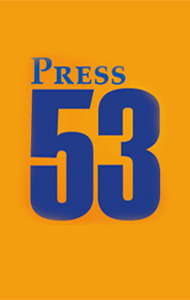 I have been very pleased by the reaction to my call for submissions to the anthology Everywhere Stories: Short Fiction from a Small Planet, which will be published by Press 53 in the fall of 2014.
I have been very pleased by the reaction to my call for submissions to the anthology Everywhere Stories: Short Fiction from a Small Planet, which will be published by Press 53 in the fall of 2014.
If you haven’t heard, each of the stories in the book will be set in a different country. If the publisher is happy with the result, we may turn it into a series. The first volume will cover 20-25 countries, but that leaves us plenty of room to visit other countries in subsequent volumes.
Submissions are open now. While the deadline for submission is December 31, 2013, I’d suggest getting your work in sooner rather than later. At some point I will begin accepting stories and so some countries will no longer be available. (I’ll post a list of the countries taken in the Guidelines so writers won’t wast their time.)
It’s a very exciting project and the response has been great so far. Keep the stories coming!
August 7, 2013
2013 Reading: The Names by Don DeLillo
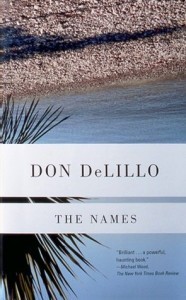 The Names by Don DeLillo is a fascinating but somewhat fuzzy book. Set primarily in Greece, it tells the story of James Axton, an American who develops risk analyses, those odd-sounding reports used by international investors and insurers. When the book was published in 1982, would readers have suspected that Axton worked for the CIA? It was the first thing I thought of.
The Names by Don DeLillo is a fascinating but somewhat fuzzy book. Set primarily in Greece, it tells the story of James Axton, an American who develops risk analyses, those odd-sounding reports used by international investors and insurers. When the book was published in 1982, would readers have suspected that Axton worked for the CIA? It was the first thing I thought of.
But Axton’s work is only a part of this intricate story about language, alphabets, secrecy, and cultural identity. He is part of an expatriate network–one that I also used to be part of–that tries to understand local cultures while existing separate from them. Language may be the key to accessing the local culture, but for most expats–Axton included–languages remain elusive. He tries Greek, but he almost revels in his failures. On the other hand, his friend Owen is obsessed with learning languages or, more precisely, their alphabets. How do these symbols really represent the cultures that created them?
There’s a lot more to it than that. The book is full of richly drawn characters seen against a complex backdrop of historical reality–it’s the summer of 1979 and the Shah of Iran has just been deposed–and its themes are plentiful if, at times, a bit hard to make out. I read the book for book club and one of the members had just read it for the third time. Even for a superfan of DeLillo, that seemed like a lot. But I wouldn’t mind taking another pass through this one to see what I missed the first time around.
August 5, 2013
Everywhere Stories: Short Fiction from a Small Planet
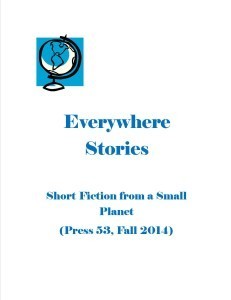 Submissions are now open for Everywhere Stories: Short Fiction for a Small Planet, an anthology to be published in Fall 2014 by Press 53.
Submissions are now open for Everywhere Stories: Short Fiction for a Small Planet, an anthology to be published in Fall 2014 by Press 53.
I’m editing the book, and I’m looking for stories from all over the world (by Americans or otherwise, but no two set in the same country). I want to include a mix of flash and longer stories. And I want to include a mix of unpublished and previously published stories.
Check out the Submission Guidelines and please submit before December 31, 2013.
If we succeed with this volume, Press 53 might turn it into a series, in which case we can keep going until we run out of countries!
Sewanee Writers’ Conference: Books
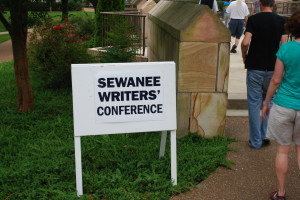 I got back from Sewanee last night and am trying to get settled in at home before my next jaunt this weekend. I’ve got some larger reflections on the conference that I’ll get to soon, but as I continue to unpack I wanted to mention that I brought home some fabulous books from the conference. This is a partial list (most of which are signed by the author):
I got back from Sewanee last night and am trying to get settled in at home before my next jaunt this weekend. I’ve got some larger reflections on the conference that I’ll get to soon, but as I continue to unpack I wanted to mention that I brought home some fabulous books from the conference. This is a partial list (most of which are signed by the author):
A Fortunate Age by Joanna Smith Rakoff
Bucolics by Maurice Manning
Straits and Narrows by Sidney Wade
War Reporter by Dan O’Brien
Nightwork by Christine Schutt
The Cherry Sisters Revisited by Dan O’Brien
You are One of Them by Elliott Holt
The Appearance of a Hero by Peter Levine
The Agriculture Hall of Fame by Andrew Malan Milward
When They Speak of Rita by Daisy Foote
Life After Life by Jill McCorkle
The Necessity of Certain Behaviors by Shannon Cain
How by Geoff Wyss
No One is Here Except All of Us by Ramona Ausubel
That ought to keep me busy for a while.
August 3, 2013
Sewanee Writers’ Conference–Wrap-up
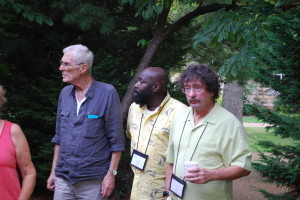 Friday’s weather continued our string of beautiful days, and as we were close to the end of the conference, our mornings began a bit later–the first reading was not until 10AM and featured fellows Charlotte Matthews, Andrew Milward, and Joseph Samuel Wright. (Charlotte is a friend from Virginia; Andrew is in the workshop I’ve been “auditing,” and Joseph is in my playwriting workshop.)
Friday’s weather continued our string of beautiful days, and as we were close to the end of the conference, our mornings began a bit later–the first reading was not until 10AM and featured fellows Charlotte Matthews, Andrew Milward, and Joseph Samuel Wright. (Charlotte is a friend from Virginia; Andrew is in the workshop I’ve been “auditing,” and Joseph is in my playwriting workshop.)
After that, Alice McDermott gave her craft lecture, which took a close look at some mistakes writers often take with exposition. In the afternoon we had one of the most stunning readings of the conference: Playwright Dan O’Brien read (with actress/playwright Lina Patel) the first act of his amazing play “The Body of an American.” Very powerful stuff. Immediately after that I met with one of the playwriting fellows, Louise Munson, to talk about my work. It was a very helpful discussion and I appreciate her taking the time to do that.
In the evening we had a wonderful reading by poet Mary Jo Salter–a mix of older and new poems.
Saturday was a slower day. Instead of readings in the morning, the second group of workshops did their last sessions. In the afternoon we had the last set of fellows’ readings: Claire McQuerry; Joanna Rakoff, and Catherine Staples. Then we heard from Ran–dall Kenan, who broke his pattern and read four shorter pieces. And after our conference banquet (lots of wine, nice beef) we had a reading by Mark Strand. Mark’s work is . . . unusual, and his delivery is pure deadpan.
And that’s it. I stopped by The Pub for a beer–we had a band, the Nashtones–but then I headed up to the French House to end the evening.
I’ll have some reflections on the whole experience in the coming days. But now . . . to drive home.
August 2, 2013
Sewanee Writers’ Conference 2013–the end is near
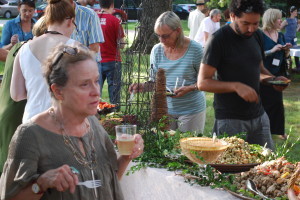 On Wednesday morning we began with another staff reading. We heard from Nick McRae, Emilia Phillips, and Chris Poole. After that, three fellows read: Ramona Ausubel, Brian Brodeur, and Louise Munson. Wonderful stuff, and I’m already anticipating missing these great readings every morning.
On Wednesday morning we began with another staff reading. We heard from Nick McRae, Emilia Phillips, and Chris Poole. After that, three fellows read: Ramona Ausubel, Brian Brodeur, and Louise Munson. Wonderful stuff, and I’m already anticipating missing these great readings every morning.
The readings were followed by Andrew Hudgins’s craft lecture which was fascinating. He took an idea for a poem through several drafts using different metrical forms, tinkering with language to make it fit the desired rhythm. Great stuff.
In the afternoon, my playwriting workshop met with Rachel Hutt from New Dramatists, an organization in New York that I’m unlikely to take advantage of. I had my one-on-one conference with Dan O’Brien after that (while Sidney Wade was giving a reading, so, unfortunately, I missed that). In the evening we had a reading by Erin McGraw.
Thursday started with a fellows reading: Kimberly Elkins, George Green, Mike Guista, and Hugh Martin, followed by Daisy Foote’s craft lecture. The afternoon reading was by Diane Johnson (pictured above at the reception following her reading) and the evening reading was by Claudia Emerson.
Just Friday and Saturday to go!
August 1, 2013
Sewanee Writers’ Conference 2013–beginning to wind down
 We only have a couple of days left to this year’s edition of the Sewanee Writers’ Conference, so let me get caught up in the happenings here.
We only have a couple of days left to this year’s edition of the Sewanee Writers’ Conference, so let me get caught up in the happenings here.
Sunday afternoon began with readings by three fellows: poet Rebecca Hazelton, playwright Lina Patel, and novelist Jamie Quatro. That was followed by a craft talk by Diane Johnson, entitled “What are we doing here?” It was a fun talk that took a serious look at some of the principles of creative writing that seem always to come under closer examination but never actually change.
Then we had a reading by poet Maurice Manning followed by the annual book-signing party at the bookstore. Because I already had the books of most of the faculty members, I mostly picked up books by fellows and got them signed, and found myself signing copies of my own book. The evening reading was by Steve Yarbrough.
Monday morning kicked off with a staff reading. We heard from Amy Arthur, Hastings Hensel, and Jake Ricafrente, all poets. I skipped the editors’ panel that followed, but came back for Tim O’Brien’s craft lecture. Tim’s talk might have been titled “Trouble, Truth, and Relativism” (I don’t remember if he mentioned a title) and he touched on topics that both Dick Bausch and Diane Johnson had also covered–in his own, wonderful way. He reminds me that what good fiction does is seek the Truth.
Poet Daniel Anderson gave the afternoon reading and the evening reading was by Christine Schutt. As a fiction writer, I was especially enthralled by Christine’s reading. Near the end of the story there is a surprising moment that caused the audience to gasp audibly, much to Christine’s delight. Great story, great reading.
On Tuesday morning we had more staff readings: Isabel Galbraith, Jonathan Heinen (one of the few fiction writers on staff), and Melissa Range. Then there was an editors’ panel with Leigh Anne Couch (Sewanee Review), David Lynn (Kenyon Review), Robert Wilson (The American Scholar), and Don Share (Poetry). The biggest news here? Poetry’s app. When Don mentioned it I downloaded it to my tablet. Very cool.
Wyatt Prunty then gave a craft talk on Randall Jerrell. In the afternoon we heard a reading by Elizabeth Spencer who, at 92, is still going strong and has a new book coming out. After that we had a reception at the University’s Archives and had a chance to look at some of the fascinating items in their collection. The evening’s reading was by A.E. Stallings, who does a lot of translations from Greek in addition to her own poems. She read a mix and was very entertaining.
More later . . .
July 30, 2013
Sewanee Writers’ Conference 2013–midway report
 Some years I have blogged every day from the Sewanee Writers’ Conference. Not this year, obviously. I’ve been busy.
Some years I have blogged every day from the Sewanee Writers’ Conference. Not this year, obviously. I’ve been busy.
The main reason for that is that I’m more or less doing TWO workshops instead of the usual one. Not only am I doing the reading and critiquing for my playwriting workshop (with Dan O’Brien and Daisy Foote), I’m also attending (and doing most of the reading for) a workshop with Tim O’Brien and Christine Schutt. That’s one of the best fiction workshops I’ve ever seen, so I don’t regret it for a minute. Wow.
But to back up a little . . .
This year, instead of driving here myself, I caught a ride with two other conference-goers. Not only was that a good thing to do ecologically, it made the time go by fast. Before I knew it, we were in Sewanee checking in and getting settled into our dorms.
The opening night reading was given by Alice McDermott from a work in progress. It was in the same vein as her earlier work, and it was just as beautiful. On the second day, we had a craft lecture by Jill McCorkle on finding a balance between the public and private lives of our characters and ourselves. That was followed by Mark Strand, who talked about the poetry of Carlos Drummond de Andrade, including a particular poem, “In the Middle of the Road.” That afternoon we had a beautiful (if somewhat melancholy) reading by Robert Hass, and that night we had a reading by Tony Earley (from a story that I think he read a different section of the last time I was here). Along the way, I got to reconnect with Tim O’Brien, whom I hadn’t seen since our workshop here in 2008.
The next day we had a great Fellows’ Reading with Elliot Holt, Joshua Robbins, and Teddy Wayne. I confess that I skipped the editors’ panel that followed, but I returned for Richard Bausch’s craft lecture. It was a pleasant hodgepodge that could be summarized thusly: “Fiction is not life; it’s a semblance of life.” Wyatt Prunty read poetry that afternoon and that evening we heard from Jill McCorkle’s latest novel, Life After Life.
On Friday we began the staff readings with Dan Groves, Adam Vines, and Caki Wilkinson, followed by an editors’ panel with Mary Flinn (Blackbird), Roger Hodge (Oxford American), John Irwin (Johns Hopkins Review), and Philip Terzian (The Weekly Standard). Then Robert Hass gave his craft lecture, which was amazing considering that he left his notes in his cottage! The subject was the origins of modernism in poetry and he talked about Gertrude Stein, Marianne Moore, and H.D. It was simply brilliant. Later in the afternoon Tim O’Brien gave a reading. We heard “How to Tell a True War Story,” which is one of the great pieces in his book The Things They Carried. Tim got a well-deserved standing ovation for his emotional reading. Just fantastic stuff. That night, Daisy Foote put on a staged reading of a scene from her new play–rough around the edges, as she admitted from the start. Still, very interesting to see such raw work.
On Saturday morning, we heard from fellows Shannon Cain, Katy Didden, and Pete Levine. I skipped an agents’ panel, but then we had a fantastic craft lecture by Mary Jo Salter on Imagery and Exposition in Poetry–wonderful stuff and applicable to fiction, too. That afternoon, Andrew Hudgins gave a reading, mostly from his new memoir. And that night Richard Bausch read. I’d expected him to read from his recently finished novel, but instead he read a story from his Collected Stories. It was wonderful.
That brings us to Sunday, and a morning of rest for me. I’ll continue with Sunday afternoon in a subsequent post.
p.s. The typewriter pictured above is in the University Archives and is, apparently, the very typewriter used by Tennessee Williams.



